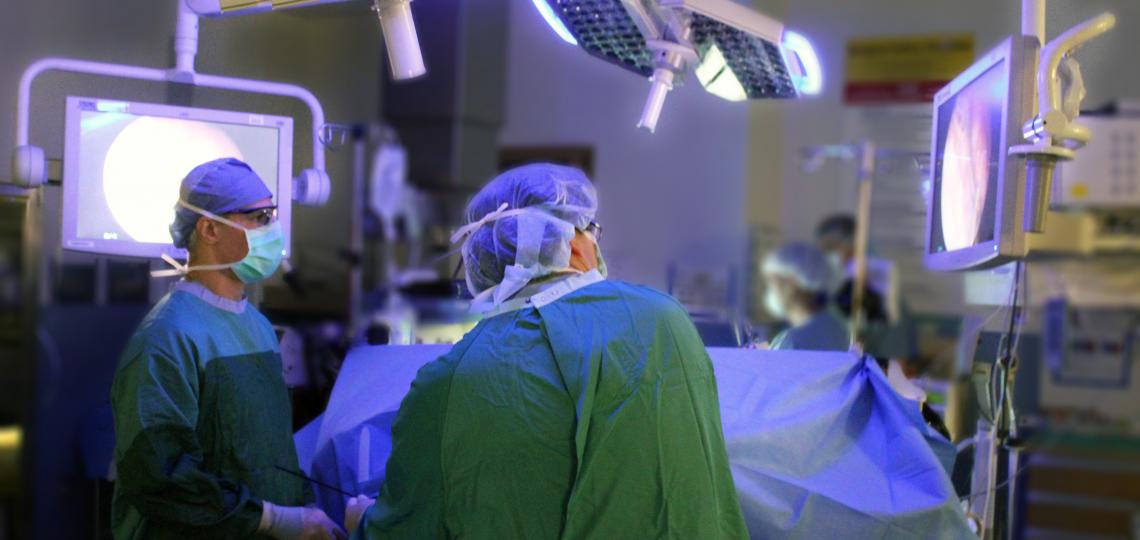
Health Services Research
In an era when change is rapid and constant, health services research has become more important than ever as we introduce ever-advancing science and technology into real-world scenarios. We need to ensure that our healthcare practices and interventions are safe, effective, equitable, and financially sustainable. As achievements in biological and material science converge with a vast expansion of computing technology and connectivity, clinicians have the responsibility to ensure that advances in medical science translate to actual improvements in patient care.
Research to Impact Health Policy Initiatives
In our increasingly regulated practice environment, quality metrics are often tied to reimbursement, but may not necessarily provide accurate measures of performance. A thorough assessment of the impact and potential consequences, intended or unintended, of such initiatives is crucial to ensuring that quality metrics are providing an accurate measure of performance. Dr. Nader Massarweh, associate professor in the Division of Surgical Oncology, has performed several studies, which have addressed quality initiatives endorsed by the Leapfrog Group as well as the National Quality Forum. With merit funding from the Veterans Administration, Dr. Massarweh has been comparing the effectiveness of alternative strategies for monitoring hospital surgical performance.
Previous work includes a retrospective study to analyze the change in complication and mortality rates over a period of 15 years, after a systems-wide quality improvement plan was implemented by the Veterans Administration for its poorly-performing hospitals. This study concluded that other integrated health systems providing a high volume of surgical care may benefit by critically evaluating the system-level approaches of the VA health system. Details of this research can be found in JAMA Surgery. This study was supported by the Department of Veterans Affairs, VA Office of Research and Development, Center for Innovations in Quality, Effectiveness and Safety (IQuESt), and by a seed grant from the Michael E. DeBakey VA Medical Center.
Research to Improve Surgical Performance
Although knowing how to question protocols and practices established by others takes insight and willingness to challenge the status quo, it takes an extra measure of courage to bring that scrutiny closer to home. That is exactly what Dr. Todd Rosengart, department chair, and Dr. James Suliburk, associate professor and chief of Endocrine Surgery, were willing to do, leading a study with their surgical colleagues to determine the types of human error being made within the department. This candid and insightful study identified human performance deficiencies in surgical care through analysis of a series of surgical morbidity and mortality conferences held in 2018. By identifying distinct causes of human error, department surgeons have been able to develop a new classifier tool to provide a framework for mitigating these kinds of errors through cognitive training and quality improvement initiatives. This important work is detailed in “Analysis of Human Performance Deficiencies Associated with Surgical Adverse Events” and made publically available through JAMA Network Open.
Research to Challenge Current Practices
Organ transplant allocation
On average, about 20 people die every day in the U.S. from the lack of available organs for liver transplant. While the number of candidates waiting for organs grows, a great many organs are being discarded for various reasons. Decisions for organ use and allocation are often based on longstanding protocols and simple risk scores such as the Model for End-Stage Liver Disease (MELD). Dr. Abbas Rana, assistant professor of surgery in the Division of Abdominal Transplantation and SHARE program participant, has been actively investigating better ways to determine risk – both risks to organ recipients and, perhaps even more importantly, the risk of organ discard, which represents an irretrievable lost opportunity to save a life. With improved evidence-based models to assess risks and predict outcomes, organs that would have been discarded are increasingly being used successfully to save lives. Recently, Dr. Rana and other researchers within the division have teamed up with InformAI to investigate the potential use of Artificial Intelligence (AI) technologies to enhance liver transplant outcomes. Traditionally, clinicians have considered a handful of variables that may impact success or failure for transplant procedures, such as age and organ size. Machine learning, however, can simultaneously analyze dozens of variables, identifying complicated, non-linear patterns of successful organ donor-recipient matches for improved allocations and outcomes.
Research to Improve Diagnosis and Treatment
Sometimes medical systems fail patients, even when both accurate diagnosis and definitive treatment is possible and safe. Dr. Konstantinos Makris, director of the Endocrine Surgery Program and the Michael E. DeBakey VA Medical Center and SHARE program participant, conducted a retrospective cohort study of 371,370 veterans with chronic hypercalcemia. Although chronic hypercalcemia is highly indicative of primary hyperparathyroidism, only 23.4% of these patients received further evaluation for this condition, which can cause associated with neuropsychiatric and cognitive disorders, musculoskeletal pain, GI tract dysfunction, and osteoporosis. Of these, 12.8% underwent definitive treatment with parathyroidectomy. This study published in JAMA Internal Medicine suggests that although eminently treatable, primary hyperparathyroidism is underdiagnosed and undertreated.
Research for Patient-Centered Care
One of the first questions patients ask their doctors prior to surgery is when they will be able to resume their normal activities. When Dr. Michele Loor, assistant professor of surgery in the Division of General Surgery, realized that she could not give her patients an answer grounded in evidence from solid research, she conducted an online survey to determine surgeon recommendations for convalescence after an abdominal operations. Their answers, described in this Surgery publication, indicated a wide variation in practices and a lack of evidence to guide decision making.
These concerns about post-operative activity recommendations are important questions, as recommendations that are too restrictive often impact patients financially, delaying their return to work. On the other hand, putting strain on a surgical incision site too soon has the potential to cause serious, often long-term complications, such as hernia development. Future clinical trials examining various durations and intensities of postoperative restrictions will be important to determine a safe and patient-centered approach for recovery after an abdominal operation. Dr. Loor is currently participating in the IQuESt SHARE mentoring program.








